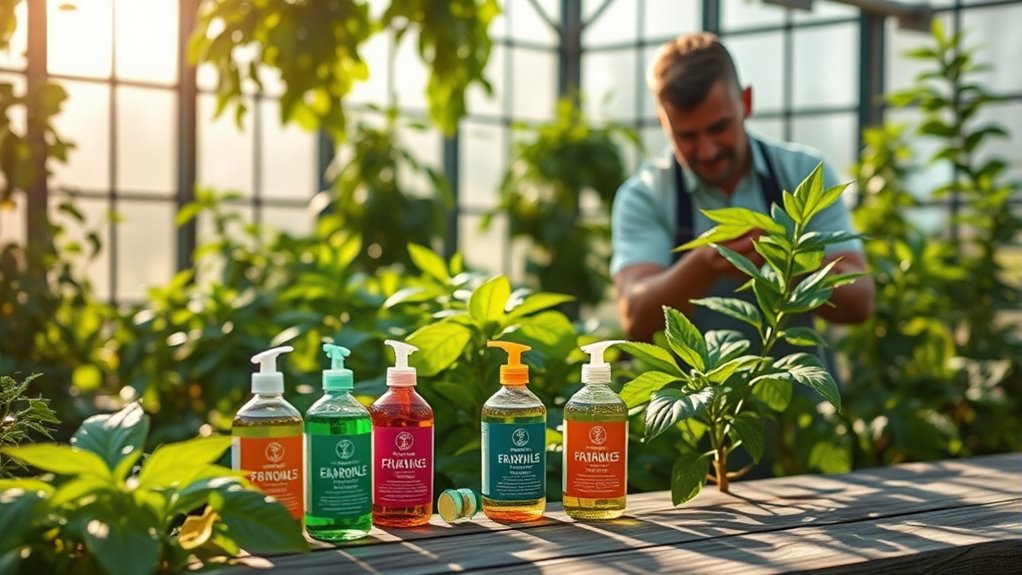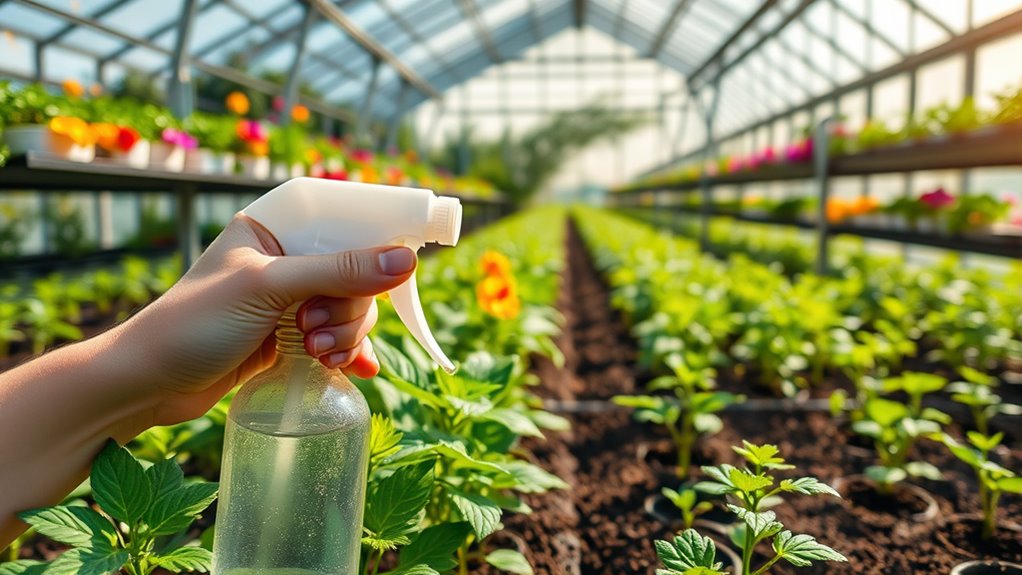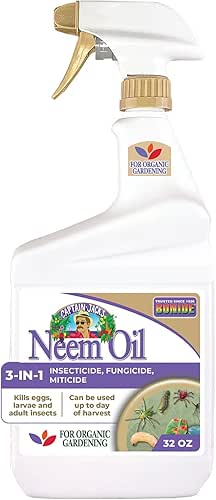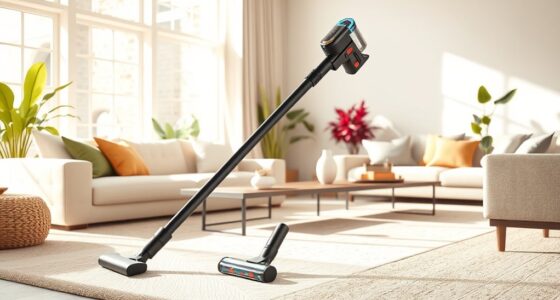I've found that using organic pesticides is essential for keeping greenhouse plants healthy while being eco-friendly. Options like Miticide Insecticide and Premo Guard plant protection offer effective pest management without harming beneficial insects. Products like GrowSafe Bio-Pesticide and Bonide Captain Jacks Neem Oil are great for organic gardening. Remember to reflect on factors like pest type and application method to achieve the best results. Stick around, and I'll share more details about these fantastic options!
Key Takeaways
- Organic pesticides like ImidaPro 2SC offer broad-spectrum control, ideal for greenhouse environments with a variety of pests.
- Products such as GrowSafe Bio-Pesticide are safe for humans and beneficial insects, ensuring ecological balance in greenhouses.
- OMRI-listed options like BioAdvanced Organics Insecticide guarantee safety for edible crops while effectively targeting common greenhouse pests.
- Quick-acting formulas, such as Premo Guard, provide rapid results, making them suitable for immediate pest control needs in greenhouses.
- Consideration of application methods and pest identification is crucial for successful management with organic pesticides in greenhouse settings.
Miticide Insecticide – 16oz Botanical Concentrate for Organic Use
If you're looking for an effective solution to combat pests in your greenhouse, the Miticide Insecticide – 16oz Botanical Concentrate is an excellent choice. This OMRI-listed product is perfect for organic use, targeting pesky mosquitoes, spider mites, and aphids. I love that it's a bulk concentrate, making up to 25 gallons for those larger gardens. Its multiple modes of action provide both contact kill and repellent effects, and I've seen noticeable results against spider mites within days. Just be cautious of its strong minty scent; while pleasant outdoors, it might be overwhelming indoors. Overall, it's a fantastic organic option!
Best For: Organic gardeners and greenhouse owners seeking an effective and safe solution for pest control, particularly against mosquitoes, spider mites, and aphids.
Pros:
- OMRI listed for organic use, ensuring safety for edible plants.
- Bulk concentrate makes up to 25 gallons, ideal for large gardens.
- Multiple modes of action provide effective pest control and repellent effects.
Cons:
- Strong minty scent may be overwhelming when used indoors.
- Mixed results reported by some users regarding effectiveness against aphids.
- Clearer guidelines on indoor use could enhance user confidence.
Premo Guard Plant & Garden Pest Control (32 oz)
Premo Guard Plant & Garden Pest Control (32 oz) stands out as an excellent choice for organic gardeners who prioritize safety and effectiveness. I love its natural, plant-based formula that's safe around kids and pets when used correctly. This spray tackles a wide range of pests, like aphids and spider mites, and works quickly—often within hours. I appreciate that it can be used on veggies, flowers, and indoor plants. While it's generally effective, some pests may require multiple applications. Plus, the pleasant odor is a bonus! With a money-back guarantee, it's a risk-free choice for any gardener.
Best For: Organic gardeners who prioritize safety and effectiveness in pest control solutions.
Pros:
- Child and pet-safe formula allows for worry-free use around family and pets.
- Effective against a wide range of pests, including aphids and spider mites, often working within hours.
- Versatile application on vegetables, flowers, indoor plants, fruits, herbs, trees, and shrubs.
Cons:
- Some pests may require multiple applications for effective control, leading to potential plant stress.
- Effectiveness can vary by pest, with some users reporting limited success against certain insects.
- May not be suitable for those who prefer synthetic chemicals, as it focuses on a natural approach.
ImidaPro 2SC Insect & Pest Control (32 Ounces)
ImidaPro 2SC Insect & Pest Control (32 Ounces) stands out as an excellent choice for anyone managing both residential and commercial greenhouses, particularly those grappling with a broad spectrum of pests. With its impressive efficacy against over 100 pests, including ants and mealy bugs, it simplifies my pest control routine. The easy application via Tip and Pour bottles makes it user-friendly. I appreciate that it's safe for sensitive plants like orchids. However, I remain cautious about its impact on bees, so I apply it judiciously. Overall, ImidaPro offers great value and effectiveness for maintaining healthy plants in my greenhouse.
Best For: Homeowners and commercial greenhouse managers seeking an effective solution for a wide range of pest problems.
Pros:
- Highly effective against over 100 pests, providing broad-spectrum control.
- User-friendly application with Tip and Pour bottles for easy usage.
- Safe for sensitive plants, making it suitable for diverse gardening needs.
Cons:
- Potential harm to bees, necessitating careful application near blooming plants.
- Some customers report missing gloves from their orders.
- Price may be considered high by some users, leading to mixed feedback on value.
GrowSafe Bio-Pesticide, Organic Miticide, Fungicide and Insecticide (1.45 Gal)
For anyone passionate about organic gardening, GrowSafe Bio-Pesticide stands out as the ideal solution for managing pests in greenhouses. This 1.45-gallon product effectively tackles spider mites, whiteflies, and powdery mildew using all-natural, food-based ingredients. I love that it's safe for humans, pets, and beneficial insects, which means I can spray it without worry. After using GrowSafe, I've seen remarkable results—my plants recover quickly without any harmful residue or strong odors. Plus, it's easy to apply and mixes well with water. I can't recommend keeping this in your gardening supplies enough for effective, organic pest management!
Best For: Organic gardeners looking for a safe and effective solution to manage pests like spider mites and whiteflies without harming beneficial insects.
Pros:
- Effective against a wide range of pests, including spider mites, whiteflies, and powdery mildew.
- Safe for humans, pets, and beneficial insects, allowing for worry-free application.
- Easy to mix and apply, with no harmful residue or strong odors.
Cons:
- May require multiple applications for optimal results.
- Limited to pests listed; may not be effective against all types of garden pests.
- Availability may vary, making it less accessible for some gardeners.
Bonide Captain Jacks Neem Oil, 32 oz Ready-to-Use Spray for Organic Gardening
If you're looking for a versatile solution for pest control in your garden, Bonide Captain Jacks Neem Oil is an excellent choice. This ready-to-use spray tackles a variety of pests, including spider mites and aphids, without the hassle of mixing. I love that it's derived from neem seeds, making it safe for all my plants—roses, vegetables, and even indoor houseplants. It works on all insect life stages, so I can apply it year-round. Just keep in mind, it has an unpleasant odor, so I always spray it outdoors or in well-ventilated areas. Give it a try!
Best For: Gardeners seeking an organic, multi-purpose solution for pest control that is safe for a wide variety of plants.
Pros:
- Effective against various pests, including spider mites and aphids, across all insect life stages.
- Ready-to-use formula eliminates the need for mixing or diluting, making application quick and easy.
- Derived from neem seeds, making it suitable for organic gardening and safe for use on flowers, vegetables, and indoor plants.
Cons:
- Some users report an unpleasant odor that may be off-putting during application.
- Ineffectiveness noted against certain pests, such as Japanese beetles, leading to mixed user experiences.
- Confusion among users regarding the specific action of the product on different pest types.
Garden Safe 32 oz. Insecticidal Soap Ready-to-Use, 1 Count (Pack of 1)
Garden Safe 32 oz. Insecticidal Soap is my go-to solution for tackling pests in my greenhouse. This ready-to-use spray requires no mixing, making it incredibly convenient. I simply apply it thoroughly on all plant parts, especially the undersides of leaves, to effectively target aphids, mealybugs, and other pesky insects. It's safe for edible plants and can be used right up to harvest day. With an impressive rating of 4.4 stars from over 10,000 reviews, I've found it delivers quick results with minimal harm to my plants. Just remember, persistent pests might need a few applications for complete control.
Best For: Gardeners looking for an effective, easy-to-use solution for controlling a variety of pests on both edible and ornamental plants.
Pros:
- Ready-to-use formula eliminates the need for mixing, saving time and effort.
- Safe for use on edible plants, allowing application right up until harvest.
- High user satisfaction with quick results and minimal harm to plants.
Cons:
- May require multiple applications for persistent pest infestations.
- Effectiveness can vary depending on the pest and environmental conditions.
- Limited to contact kill; does not provide residual protection after application.
BioAdvanced Organics Tomato, Vegetable & Fruit Insecticide (24 oz)
BioAdvanced Organics Tomato, Vegetable & Fruit Insecticide (24 oz) stands out as an excellent choice for organic gardening enthusiasts who prioritize safety and efficacy. This OMRI-listed, 3-in-1 solution effectively protects a variety of plants, including vegetables, fruit trees, and herbs. I love how it kills pests like aphids and caterpillars on contact while also tackling powdery mildew. Users rave about its ease of use and quick results, though some have noted it struggles with specific pests like spider mites. Overall, I find it a reliable option that's worth repurchasing for maintaining a healthy garden.
Best For: Organic gardening enthusiasts seeking a safe and effective solution for pest control on a variety of plants.
Pros:
- Effective against a wide range of pests like aphids, caterpillars, and mealybugs.
- OMRI-listed for organic gardening, ensuring safety for edible plants.
- Easy to use with quick action, providing visible results shortly after application.
Cons:
- Some users report limited effectiveness against specific pests, such as spider mites.
- May not completely eliminate all pest populations, requiring additional treatments.
- The spray form may require frequent reapplication after rain or watering.
NATRIA Neem Oil, Ready-to-Use, 24 OZ
NATRIA Neem Oil, Ready-to-Use, 24 OZ is an ideal solution for eco-conscious gardeners seeking a chemical-free approach to pest management. This versatile insect repellent works on both indoor and outdoor plants and can be applied right up to the day of harvest. I've found it effective against common pests like aphids and spider mites, and it even helps combat fungal diseases like powdery mildew. While it has a noticeable odor initially, it fades quickly. I appreciate its ease of use and safety for beneficial insects, making it a solid choice for maintaining healthy plants in my greenhouse.
Best For: Eco-conscious gardeners looking for a chemical-free pest management solution for their indoor and outdoor plants.
Pros:
- Effective against a wide range of pests, including aphids, spider mites, and whiteflies.
- Helps control various plant diseases like powdery mildew and rust, promoting healthier plants.
- Easy to apply with a ready-to-use formulation and spray nozzle, making it convenient for users.
Cons:
- Some users report temporary control of pests, requiring multiple applications for long-term effectiveness.
- The product has a strong initial odor that may be off-putting, although it fades quickly.
- Mixed feedback on long-term pest management, with some experiencing a resurgence of infestations.
Garden Safe 32 oz. Houseplant and Garden Insect Killer Ready-to-Use
For anyone looking to maintain a healthy greenhouse while ensuring their plants remain safe, the Garden Safe 32 oz. Houseplant and Garden Insect Killer Ready-to-Use is a fantastic option. This spray effectively tackles over 100 pests, including aphids and hornworms, thanks to its fast-acting formula. I love that it's safe for edible crops right up to harvest day. Suitable for a variety of plants, you can confidently use it in your home garden or greenhouse. Just remember to read the label and follow the instructions to maximize its effectiveness. With a 4.4-star rating, it's definitely worth trying!
Best For: Gardeners looking for an effective and safe insect killer for their indoor and outdoor plants, including edible crops.
Pros:
- Fast-acting formula that kills over 100 listed insects on contact.
- Safe for edible crops up to the day of harvest, making it ideal for organic gardening.
- Versatile application suitable for a wide variety of plants, including vegetables, herbs, and ornamental plants.
Cons:
- Some users reported limited effectiveness against specific pests like fungus gnats.
- May not be suitable for very small plants due to potential over-spray or damage.
- Requires careful adherence to application instructions for optimal results.
BioAdvanced Organics Brand Houseplant Insect Killer, Ready-to-Use, 24 oz
If you're looking for a fast-acting solution to keep your houseplants healthy, the BioAdvanced Organics Brand Houseplant Insect Killer is an excellent choice. This ready-to-use spray tackles various pests like aphids, mealybugs, and spider mites quickly. I love that it's safe for both indoor and outdoor use and is OMRI-listed for organic gardening. Plus, it controls powdery mildew, which is a bonus for my plants. Users rave about its effectiveness and lack of strong odors. Just spray the affected areas weekly or bi-weekly, and your plants will thrive without the worry of pests invading them.
Best For: Those seeking an effective and organic solution to manage pests and diseases on houseplants.
Pros:
- Quick-acting formula that effectively targets a variety of pests.
- OMRI-listed, making it safe for organic gardening practices.
- No strong odors, ensuring a pleasant application experience.
Cons:
- Some users report mixed effectiveness against specific pests like gnats.
- Regular applications may be necessary for ongoing pest management.
- May require relocation of plants during application for best results.
Bonide Captain Jacks Fruit Tree Spray (32 oz Concentrate)
Bonide Captain Jack's Fruit Tree Spray is an excellent choice for organic gardeners looking to protect their fruit trees from pests and diseases. This 32 oz concentrate features Cold Pressed Neem Oil, which works as a fungicide, insecticide, and more. I love that it's organic and safe to use right up until harvest. Applying it is easy—just mix with water and spray it on your plants or drench the soil. I've noticed significant improvements in my apple and peach trees, with fewer pests around. Just keep in mind that reapplication may be necessary every few days for best results.
Best For: Organic gardeners seeking to control pests and diseases on fruit trees safely and effectively.
Pros:
- Effective against a variety of pests including aphids, gnats, and caterpillars.
- Organic and safe to use right up until harvest, making it ideal for health-conscious gardeners.
- Easy application as a foliar spray or soil drench, enhancing user convenience.
Cons:
- Frequent reapplication may be required, as effects can last only a day or two.
- Potentially less effective against severe infestations, necessitating additional treatments.
- Some users may find the need for careful mixing and application to achieve optimal results.
Mighty Mint Peppermint Plant Protection Spray (16 oz)
Mighty Mint Peppermint Plant Protection Spray is an excellent choice for plant owners seeking a natural solution to pest problems. Made with powerful, plant-based peppermint oil, this spray effectively tackles insects, gnats, and mites. I love how easy it is to apply and clean up afterward. Users often rave about the invigorating scent, which isn't overpowering. While I've seen quick results against flying bugs, I've noticed it might not completely eliminate stubborn pests like ants or whiteflies. It's a great option for protecting plants, but I'd suggest combining it with other methods for persistent infestations.
Best For: Plant owners looking for a natural and effective solution to pest issues.
Pros:
- Made with natural US peppermint oil, providing a pleasant and balanced fragrance.
- Effectively kills a variety of pests, including flying bugs and soil insects, with instant results on contact.
- Safe to use around people and pets when used as directed, making it a family-friendly option.
Cons:
- Some users report that it may not completely eradicate stubborn pests like ants and whiteflies.
- The spray may deplete quickly, necessitating frequent reapplication.
- There are concerns regarding safety for pets, particularly cats, due to peppermint's potential toxicity.
Bonide Insecticidal Soap, 32 oz Ready-to-Use Spray for Insect Control
For gardeners seeking a reliable solution to combat pests in their greenhouses, the 32 oz Ready-to-Use Spray of insecticidal soap stands out. This multi-purpose spray targets common pests like aphids, spider mites, and caterpillars without harming beneficial insects. Its active ingredient, potassium salts of fatty acids, is safe for organic gardening and can be used up to harvest day. I love the ease of application, as the convenient nozzle allows precise targeting, even in hard-to-reach spots. Plus, it's pet-friendly! Just remember to reapply as needed, especially since it doesn't eliminate eggs. It's an effective, eco-friendly choice.
Best For: Gardeners looking for an effective, eco-friendly insect control solution that is safe for organic gardening and pets.
Pros:
- Multi-purpose: Effectively targets a wide range of pests, making it suitable for various plants.
- Organic and safe: Approved for organic gardening and safe to use up to the day of harvest.
- User-friendly: Ready-to-use spray with a convenient nozzle for precise application.
Cons:
- Reapplication needed: May require multiple applications to manage full pest life cycles, as it does not kill eggs.
- Application conditions: Should be used with care to avoid direct sunlight, which can harm plants.
- Limited to contact: Kills pests primarily through direct contact, which may not address hidden infestations thoroughly.
Factors to Consider When Choosing Organic Pesticides for Greenhouses

When choosing organic pesticides for my greenhouse, I focus on a few key factors. I make certain to accurately identify the pests I'm dealing with and consider the active ingredients that will effectively target them. It's also essential to guarantee the pesticide is safe for beneficial insects and easy to apply.
Pest Identification Accuracy
How can I guarantee I'm using the right organic pesticide for my greenhouse? Accurate pest identification is key. If I misidentify a pest, I might end up using an ineffective product, wasting my time and resources while potentially harming beneficial organisms. Different pests need different treatments, so I must match the pesticide to the specific pest species for the best results. Understanding the life cycle of pests also helps me time my applications correctly, as some organic pesticides may not target all life stages effectively. To enhance my identification accuracy, I rely on pest identification guides and consult agricultural extension services. This way, I can make informed pesticide choices that truly benefit my plants.
Active Ingredients Preference
Accurate pest identification sets the stage for selecting the right organic pesticide, but the choice of active ingredients is just as important. I always look for active ingredients derived from natural sources, like neem oil or peppermint oil, which effectively target pests while being safer for both humans and beneficial insects. It's vital to take into account the toxicity profile; organic options generally present lower risks compared to synthetic chemicals. Additionally, I note that some pesticides work on contact, providing quick results, while others may require multiple applications to target specific pest life stages. Ultimately, matching the active ingredients to the specific pests I'm dealing with—like aphids or spider mites—helps shape a more effective pest management strategy in my greenhouse.
Safety for Beneficial Insects
Selecting organic pesticides isn't just about targeting pests; ensuring the safety of beneficial insects is equally essential for maintaining a balanced ecosystem in my greenhouse. I always choose products specifically labeled as safe for these helpful species, like pollinators and natural predators. Many organic options, such as neem oil or insecticidal soaps, effectively target pests while sparing beneficial insects. Timing is critical too; I apply pesticides during non-blooming periods to protect active bees and butterflies. I also prefer biodegradable products that break down quickly, minimizing harmful exposure. By integrating pest management strategies with cultural practices, I can promote natural pest control while using targeted organic pesticides, ensuring my greenhouse remains a safe haven for all its inhabitants.
Application Method Convenience
Maintaining the safety of beneficial insects while managing pests is just one part of effective greenhouse care. I find that the convenience of application methods can greatly simplify pest management. Ready-to-use sprays are a favorite of mine because they require no mixing and allow for immediate use. I also appreciate products that can be applied as both foliar sprays and soil drenches, giving me flexibility in targeting pests. Quick-drying formulations minimize plant damage and enable faster reapplication during outbreaks. Additionally, I prefer spray applications that target both the tops and undersides of leaves for thorough coverage. User-friendly designs, like nozzles that allow precise targeting, are essential for reaching those tricky spots in my greenhouse.
Efficacy Against Target Pests
When choosing organic pesticides for my greenhouse, I focus on their efficacy against specific pests like aphids, spider mites, and whiteflies. It's important to guarantee the product I select effectively targets these insects, as not all organic pesticides perform equally. I appreciate those that employ multiple modes of action, combining contact killing with repellent properties, which can broaden their effectiveness. User feedback often highlights that some products may need several applications for complete control, so I always follow the recommended usage instructions. I also consider the formulation; those with natural oils tend to act faster than soap-based ones. By monitoring the specific pest species in my greenhouse, I can make better choices for effective pest management.
Environmental Impact Consideration
Considering the environmental impact of organic pesticides is essential for anyone managing a greenhouse. I've found that organic options are typically derived from natural sources, which helps protect non-target organisms and supports biodiversity. Many of these pesticides break down quickly, reducing the risk of soil and water contamination compared to synthetic ones. Plus, they promote the health of beneficial insects like pollinators and natural pest predators, vital for a balanced ecosystem. With lower toxicity for humans and pets, organic pesticides create a safer environment for everyone involved. By implementing organic pest management practices, I can also enhance soil health and sustainability, as many of these products improve microbial activity in the soil.
Residue and Harvest Timing
Choosing the right organic pesticide for my greenhouse requires careful attention to residue and harvest timing, especially since I want to guarantee my crops remain safe for consumption. Many organic pesticides are approved for use up to the day of harvest, which gives me flexibility in application. I always check for OMRI listings or similar certifications to confirm compliance with organic standards and safety for residue levels. Some options, like insecticidal soaps, break down quickly, reducing potential residue. However, I know that the effectiveness and safety can vary based on active ingredients, so I always follow application instructions and reentry intervals on the label to protect both my plants and my consumers after harvest.
Cost-Effectiveness Analysis
Cost-effectiveness plays a crucial role in my decision-making process when selecting organic pesticides for my greenhouse. I always consider the concentration and dilution rates, as higher concentrated products can yield more application volume, reducing overall costs. The effectiveness of these pesticides also impacts long-term expenses; products needing fewer applications or delivering quicker results save money in the long run. I pay attention to user feedback, as reviews can highlight which pesticides provide effective pest control and lower spending over time. Additionally, I assess reapplication frequency—products requiring multiple applications can inflate costs. Finally, I look for bulk purchase options, which can make buying organic pesticides more economical, especially when managing large areas or numerous plants.
Frequently Asked Questions
Are Organic Pesticides Safe for Edible Plants?
I've often wondered if organic pesticides are safe for edible plants, and I can confidently say they usually are. These products focus on natural ingredients, reducing harmful residues on our food. I always check for certifications and read labels carefully. While they're generally safer than synthetic options, I still recommend using them sparingly and following application guidelines. It's all about keeping my plants healthy while ensuring my family's safety when we enjoy our harvest!
How Often Should I Apply Organic Pesticides?
Picture my garden thriving, vibrant colors dancing in the sun. I've learned that applying organic pesticides depends on the pest pressure and my plants' growth stages. Generally, I apply them every 7 to 14 days, especially after rain. I always check for signs of pests before deciding, ensuring I protect my plants without overdoing it. Keeping a close eye helps me maintain that lush, healthy garden I cherish so much.
Can I Mix Different Organic Pesticides?
Absolutely, you can mix different organic pesticides, but I always recommend doing it with caution. I've found that some combinations can enhance effectiveness, while others might cancel each other out or even cause harm to your plants. It's best to research each product's ingredients and test a small batch first. Keeping track of what you mix helps me learn what works best for my garden, and that's been really beneficial!
What Are the Signs of Pesticide Resistance in Plants?
Imagine a knight battling an invincible dragon. That's what it feels like when plants develop pesticide resistance. I've noticed signs like reduced pest control effectiveness, where pests seem to thrive despite my efforts. Yellowing leaves and stunted growth can also signal trouble. If you see these signs, it might be time to rethink your strategy. Just like a knight needs new armor, my plants need a fresh approach to fend off those pesky invaders.
How Should I Store Organic Pesticides Safely?
When I store organic pesticides, I make sure to keep them in their original containers with labels intact. I find a cool, dry place away from direct sunlight, and I always secure them in a locked cabinet, especially if there are kids around. It's important to keep them out of reach of pets too. I check expiration dates regularly, so I'm only using effective products when I need them.
Conclusion
In my journey to create a thriving greenhouse, I've discovered these 13 organic pesticides that truly make a difference. Each option offers unique benefits, but the best part? You can protect your plants without harming the environment. Imagine the joy of watching your healthy plants flourish, safe from pests. But wait—there's more to explore! With the right combination, you can reveal the secret to a vibrant, pest-free greenhouse. Are you ready to transform your gardening game?






















